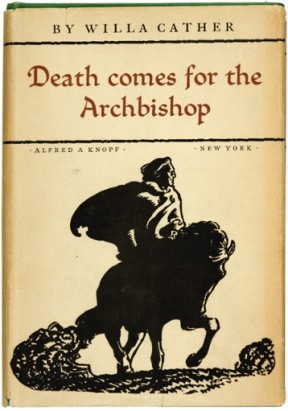Today looks like a good day to curl up with a new Word on Fire Book Club selection. Our resident bibliophile and book club moderator Ellyn von Huben introduces Willa Cather’s “Death comes to the Archbishop”. Dust off your copy (or order a new one) and join in the discussion!
Now I have been given another chance to reveal a gap in my education; and to invite people along while I expand my mind. Willa Cather is an important name in American literature (that much I have learned tangentially over the years) but I must have been playing hooky when she came up in class. (I totally blame myself – not the schools) But like the reading others did, but was not assigned to me (e.g. Catcher in the Rye, Lord of the Flies), Cather was not an an author I sought out. She sounded stern. Boring. O Pioneers sounded like a cowboy story. (It’s not.) Nope. Not for me.
Recalcitrant children – of any age – need to be redirected. They need to be pointed in the proper direction; which is exactly what happened to me when Willa Cather’s Death Comes for the Archbishop came up as our next book club offering. I am happy to have been finally nudged to read one of “Time’s 100 Best English-language Novels”.
Wilella (which she shortend to Willa) Sibert Cather was born in 1873 and graduated from the University of Nebraska in 1894. Her career began as a magazine writer and editor and she later wrote books including the acclaimed and popular “Prairie Trilogy” (O Pioneers , The Song of the Lark, and My Ántonia)—no, not cowboy stories.
There is not as much personal information available about Cather as we have with some writers. The term secretive is a negative way of phrasing it – so I would just say that she kept her personal life personal. She destroyed correspondence and forbade anyone from publishing her letters. This a unfortunate when one considers the wealth us information we get from other esteemed authors. The Habit of Being, the collected correspondence of Flannery O’Connor comes to mind as a treasury that informs the mind of both readers and writers. Willa Cather left no such inheritance for us – only her writing.
Raised as a Baptist, she began attending the Episcopalian Church in the early 1900’s. Her works shows a fascination with the Catholic Church, a reverence for the rich beauty and ritual of the Church. In our selection, which Cather based on the real story of Jean-Baptiste Lamy, the first Archbishop of Santa Fe, New Mexico, the author becomes a conduit for the beauty and suffering to be found in the American Southwest in the early years of our country.
The quickening pace of the early twentieth century was not something that Miss Cather applauded. In a rare “New York Times” interview in 1924, she shared her dismay at the increasing speed of American life: “Restlessness such as ours, success such as ours, do not make for beauty…..Nobody stays at home any more, nobody makes anything beautiful any more. Quick transportation is the death of art. We can’t keep still because it is so easy to move about.”
This sense of slowness (including the introductory slow travels of our protagonist which baffle the modern mind) and appreciation of moments saturated with beauty are part of the appeal of this book. Portrayal of the good, the true, and the beautiful is a gift not restricted to the Catholic writer. And Willa Cather has a respectful perspective to create a fictional treatment of a pivotal time in the history and spiritual life of our country. She gives us more than the story of priests sent to spread the Gospel, but also priests of different countries in conflict with each other. The characters are so real, so fully ‘formed’ and presented with as much detail as is given to the depiction of the beautiful and unforgiving terrain.
I hope that this is an opportunity for any people like me, who have been dragging their heels, to reconsider Willa Cather’s work. And for those of you who have already read this classic of American literature to give it another look and join in the discussion.
Ellyn von Huben is a writer, speaker and Word on Fire Blog contributor.
Like us on Facebook
Follow us on Twitter
